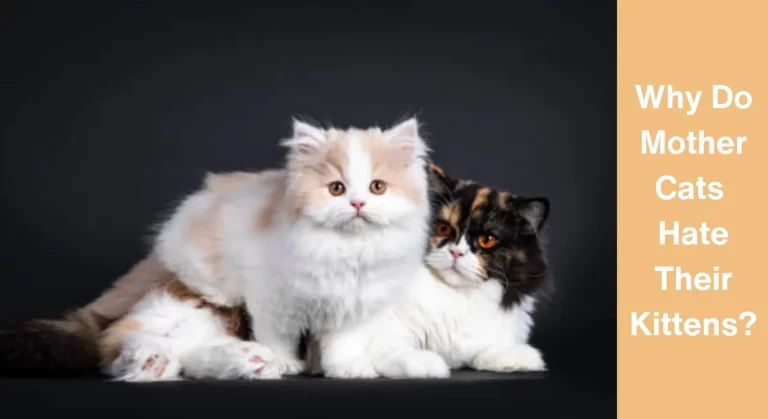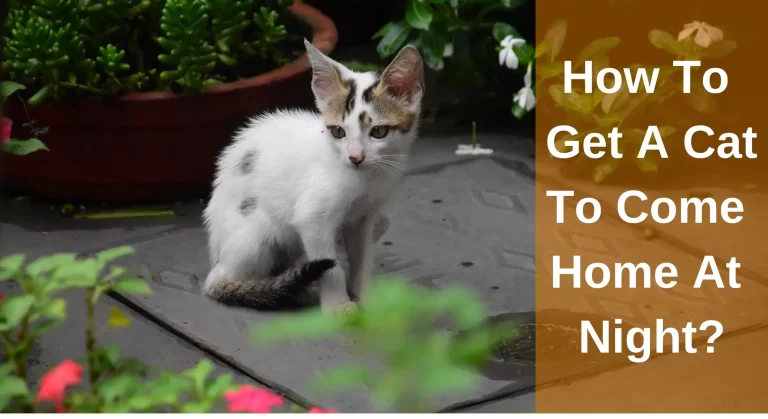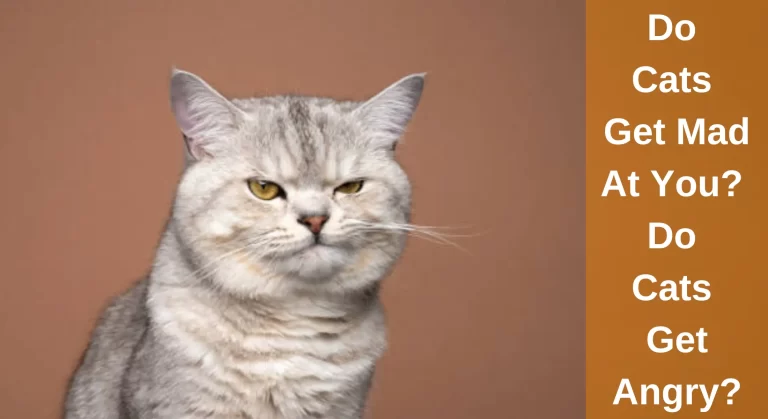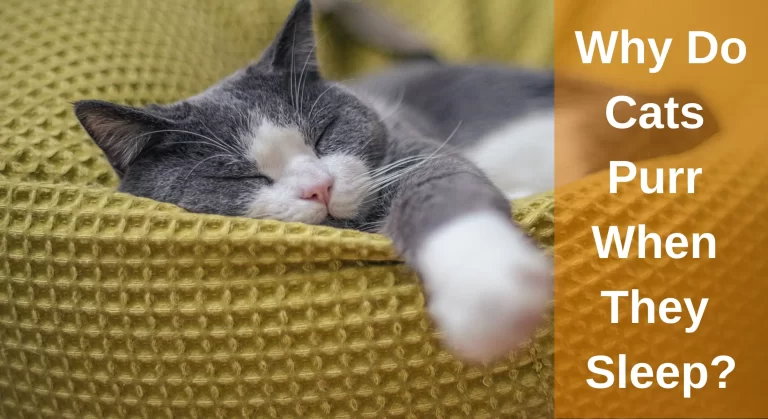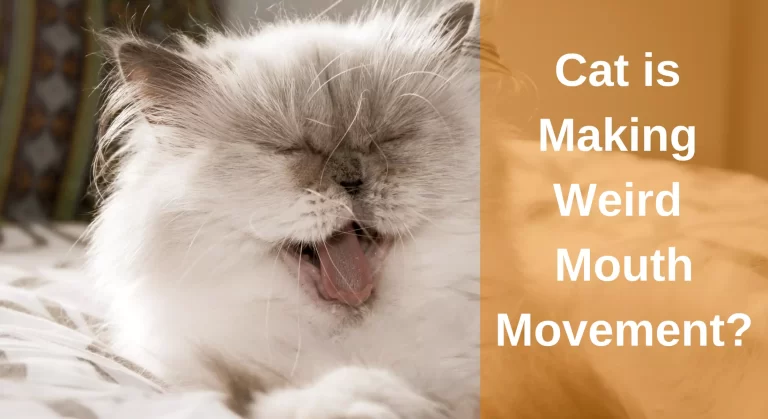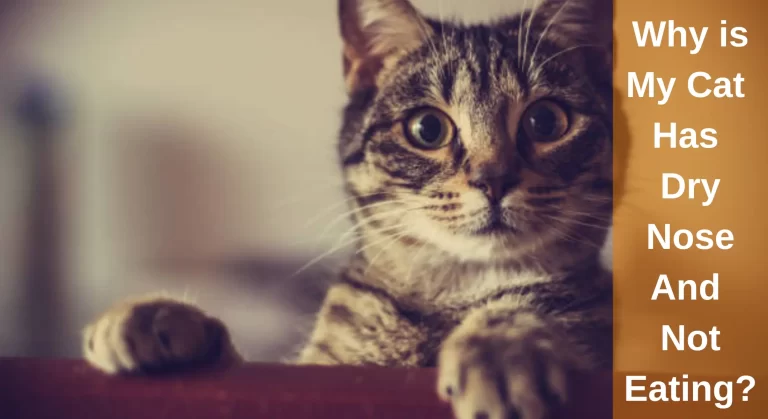Why Is My Cat Throwing Up Food But Acting Normal? All You Need To Know
Cat owners will likely have seen them vomit at least once a month. Some cats have such a high frequency of vomiting that their owners think it is “normal,” but this is not the case. Vomiting in cats is never natural, and frequent vomiting can indicate a severe illness in your cat, even if not all instances necessitate an immediate trip to the veterinarian.
Why is my cat throwing up food but acting normal? Many factors can cause cats to throw up food but if they’re acting normal, it’s likely due to harmless causes, including food allergies, hairballs, eating too fast, overeating, sudden change in diet, gulping, gastrointestinal obstructions, parasitic infections, and ingesting foreign substances. But if vomiting persists or is accompanied by other concerning signs, consulting a veterinarian is recommended
Here you will find some information about cats throwing up, their food causes, and potential treatments, so you can determine the specific reasons why your pet is vomiting its food and how to treat it so you can choose the right veterinary care for your pet.
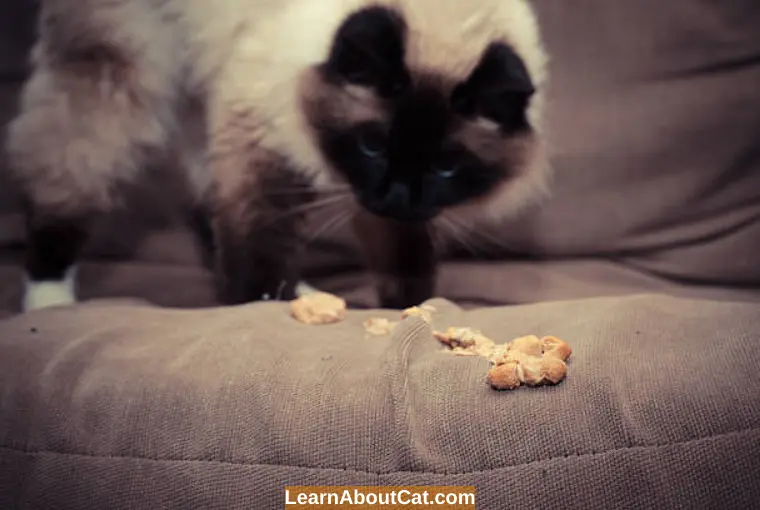
Reasons My Cat Keeps Throwing Up But Seems Fine
There are several causes for a cat to vomit after having a meal but then act completely fine afterward. In most situations, particularly when there are no additional visible signs, there’s no reason to worry. However, if vomiting is accompanied by a decrease in hunger, fatigue, or losing weight, you must be concerned. Let’s learn more about the reasons for vomiting and how to treat it.
1. Overeating
Cats have the same tendency to overeat same as humans. Felines must consume tiny meals numerous times throughout the day, but sadly, this isn’t always the truth. Don’t assume the feline to consume only a small fraction of the dish if you overfill it.
She probably will consume it all vomit as a result. You can easily resolve this issue by controlling the quantity of food you give your felines and trying to distribute your feline’s foods equally during the day.
Cat overeating is a more prevalent issue in households with several cats, and it can be more difficult to resolve. In general, you mustn’t be concerned about overeating, but if they do it on a daily basis, you should be concerned and address this problem. Otherwise, overeating may cause huge problems.
2. Eating too Soon
Most cats are known for being obsessed with food items. Our cats adore a tasty dinner! But occasionally, they’re so fascinated with it they decide to devour it quickly. As you know cat didn’t have sufficient time to digest this meal, the action is reflux rather than vomiting.
Felines have a horizontally oriented oesophagus as opposed to a vertically oriented one. So, the meal can easily pop back up if they consume too quickly. As you’re undoubtedly aware, cats are fierce competitors. When you offer the yummy treats, a few will become aggressive and begin to eat quickly.
For the cats, winning this battle is a requirement. If you’ve got several cats, they could become anxious about meals and fear they don’t get more than enough. They worry that some of their siblings will consume their part. Additionally, they could consume too quickly due to this and regurgitate their meal.
Interesting Reading: Why Is My Cat Throwing Up Undigested Food?
3. Hairballs
One of the most common reasons why cats vomit is hairballs. When cats are awake, they spend the majority of their time grooming. The rough surface of a cat’s tongue brushes against its fur and collects hairs as it grooms itself.
All of this hair is consumed and eventually forms stomach-based hairballs. Their stomach cannot digest the hair, and in case the hairballs in their poop aren’t passed, your cat will vomit.
Besides vomit, other symptoms include:
- Gagging
- Loss of appetite
- Diarrhea
- Constipation
- Lethargy
4. Toxic Substances
Besides unusual objects, cats can also ingest poisons that can cause digestive problems. Often they take toxins, including alcohol, coffee, antifreeze, onions, and garlic. Many indoor plants are poisonous to cats as well.
You should take immediate action and contact your veterinarian if you see that your cat has consumed some poisonous substance.
5. Food Allergies
There is also the possibility that your cat is throwing up food due to an allergy to a particular product or ingredient.
Besides vomit, other symptoms include:
- Breathing problems
- Skin problems (Itchy skin, Red skin, bald areas)
- Hair loss
- Weight loss
6. Change in Cat Diet
While cats appreciate a variety in their diet, sudden food changes may make them feel nauseous after eating or cause them to reject the food altogether. Especially those with sensitive stomachs may react badly to sudden food changes.
If you want your cat to become accustomed to the new food, you have to replace a teaspoon of its old food every day or two.
7. Inappropriate Diet
It is also possible that your cat is throwing up food but acting normally because the food quality is low or that it may contain some protein that isn’t suitable.
If you want to feed a cat appropriately, learn about the components that food for cats should have. Unfortunately, many meals contain a lot of sugar, artificial flavors, and preservatives. Cats need a diet full of essential nutrients; therefore, buying high-quality cat food should be your top concern.
8. Pancreatitis
When she gets pancreatitis, the pancreas produces various essential hormones and digestive enzymes and becomes inflamed. They will get sick since their stomach and intestines cannot digest the food properly.
A cat with pancreatitis may vomit as well as experience the following symptoms:
- Fever
- Loss of appetite
- Diarrhea
- Lethargy
- Abdominal pain
9. Gastrointestinal obstruction
Your cat swallows a lot of things, particularly ones that aren’t food. The cat shouldn’t have any problems if they are small objects as long as they can get out of the digestive tract and reach the litter box. But the bigger ones cause problems, and the food won’t be able to pass its results in vomit.
Your furry friend may be an explorer, so make sure you monitor their activities and remove any potentially harmful objects from their surroundings. All toys should be feline-friendly because even seemingly harmless items can be choking hazards.
Find Out: Why Is My Cat Throwing Up Bile for Days?
10. Gastrointestinal diseases
It may be that your cat has inflammatory bowel disease if he keeps vomiting and having diarrhea. Parasites like worms can enter your cat’s digestive tract resulting in vomiting if heavily infested.
Besides vomit, other symptoms include:
- Pain and suffering
- Decreased appetite
- Weight loss
11. Kidney and liver disease
It could be an indication of a serious kidney infection or disease if your cat throws up food along with thick yellow bile.
Besides vomit, other symptoms include:
- Weight loss
- Lethargy
- Increased thirst
- Decrease in appetite
- Discoloration of the skin and gums
What To Do If Your Cat Throws Up?
Pay attention to the food you provide your cat, including the brand and variety, as well as the quantity and rate of consumption.
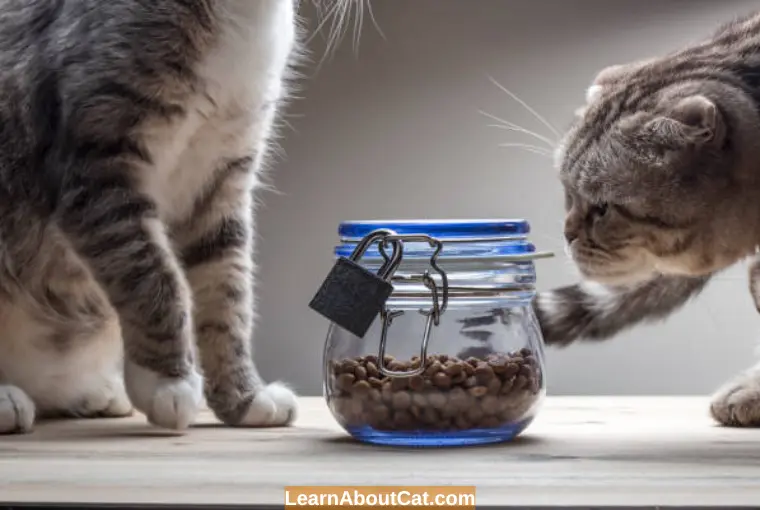
- Stop feeding the cat, remove food for two hours, but keep supplying water.
- After that, try giving them a spoonful of their regular food or some bland, low-fat chicken or white fish that has been cooked.
- If they continue in this fashion, provide small quantities spaced out throughout the following 24 hours.
- Then resume your regular routine.
It may be helpful to warm the food to 36°C if your cat is hesitant to eat after some time. Should your cat refuse food for more than 24 hours, you should take it to a veterinarian.
When Should I Be Concerned About My Cat Vomiting?
In most situations, single vomit due to raw cat meal isn’t a huge reason to be concerned. Moreover, stress, dizziness, or overeating may cause your feline to puke once in a while. But If your cat begins to vomit more frequently than 1 or 2 times each week or when it begins to be followed by other signs, you must be concerned.
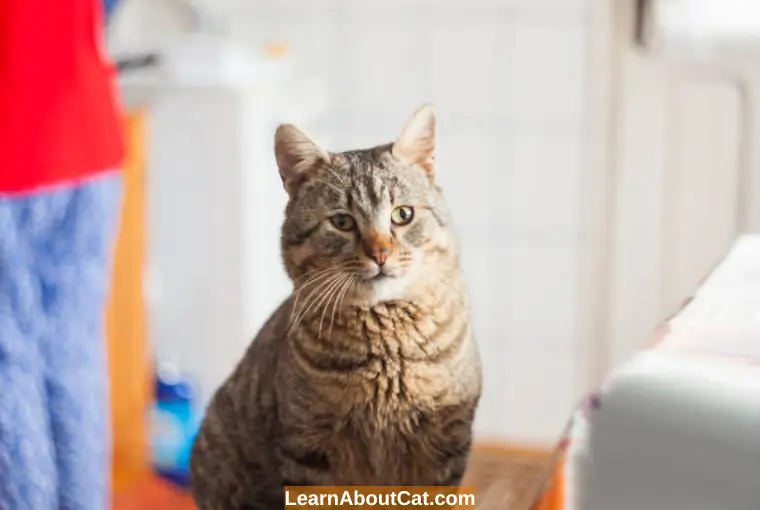
It’s important to get veterinarian assistance if your feline is:
- Weak or reduced weight
- Sick with a temperature
- Vomiting blood
- Diarrhea
- Reduce appetite
When your feline vomits or regurgitates frequently and partially, only your vet can perform the necessary examinations to treat your feline.
When Should You Visit the Vet?
Your cat may need to see a veterinarian if it shows any of the following signs alongside vomiting after eating:
- Diarrhea
- Vomiting frequently
- Blood in the vomit
- Lethargic
- Poor appetite
- Drinking more water
- Underlying medical conditions, such as kidney disease, diabetes, UTIs, or hyperthyroidism
Even if your cat is infrequently vomiting and seems otherwise healthy, you should take them to the veterinarian for a thorough checkup or call the Animal PoisonLine if you’re unsure whether your cat is in danger.
Treatment Options for Cats Who Throw Up Food
A veterinarian will carefully check your cat’s symptoms and may even recommend some tests. These examinations may entail imaging techniques, including abdominal radiography or ultrasounds, blood tests, urinalyses, parasite screenings of the feces, and other tests.
If you think your cat has consumed anything unusual, bring a stool sample, vomit sample, and anything else you can recall to the vet.
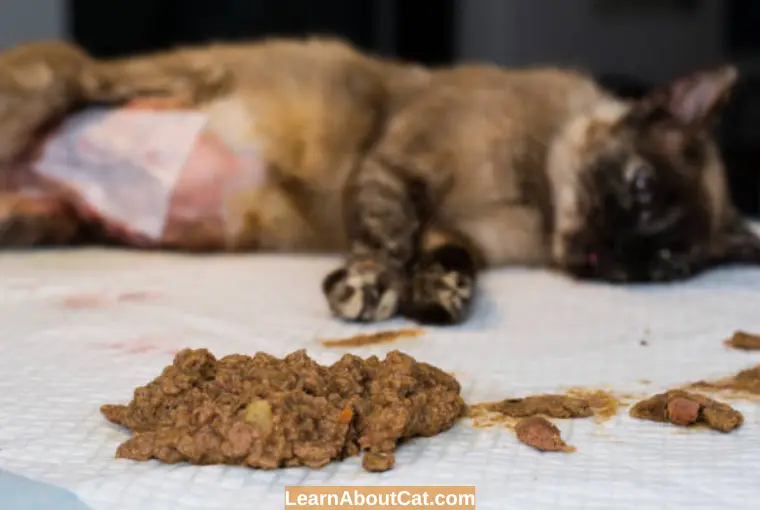
Depending on the cause of vomiting, the following treatments may be prescribed:
- Medicines for reducing nausea and
- Deworming for parasite removal
- A treatment for nauseous diseases other than those of the stomach
- Detoxification of toxic substances.
- A blockage is removed surgically.
- Diet modifications to address food allergies or hairballs.
The cat may usually be treated for moderate, acute vomiting with antiemetic medicine and a bland diet for a few days.
For your pet’s safety, see the vet often. It will help if you take your feline friend to the vet for an examination once a year.
How to Prevent Cat Vomiting?
There are ways to stop vomiting, but in order to choose one that is effective, you must first determine what is causing it. Once you’ve worked it out, read on for some advice to improve your cat’s life and reduce vomiting.
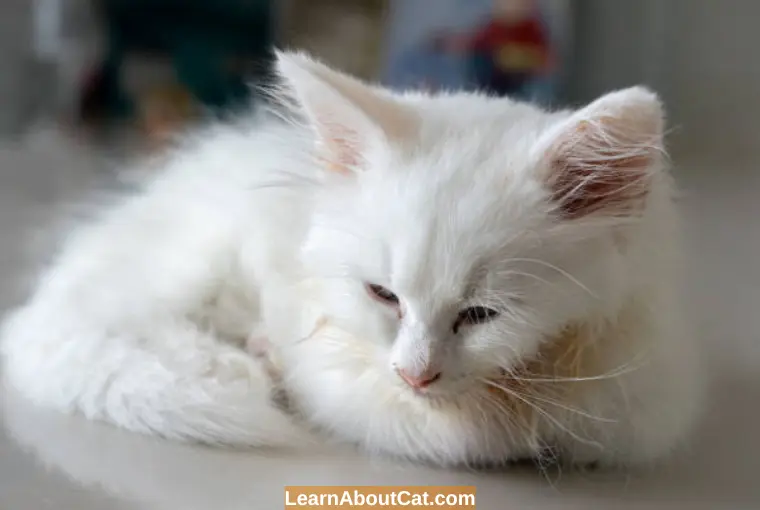
1. Slow Your Cat’s Eating
Feeding your cat several small meals throughout the day may be more effective. Also, consider using a puzzle feeder or automatic feeder that feeds pre-measured amounts throughout the day if your cat is a food hog.
2. Peaceful Environment, Remove Stressors
Lessen the tense atmosphere around your cat. Provide your cat with plenty of food, water, scratching posts, and climbing opportunities to keep them happy at home. Vomiting and nausea can result from stress.
3. Prevent Hairballs
Among the most common reasons why cats vomit are hairballs. You may take several actions to enhance the quality of life and prevent hairballs in your cat. So, routine brushing of your feline’s fur helps in preventing hairballs.
4. Maintain Healthy Habits: Balanced Diet
You should also learn what a healthy cat diet entails and the recommended proportions of proteins, lipids, and carbohydrates. Some of the foods you feed your cats may cause them to have gastrointestinal problems, and they could even vomit.
5. Visit the Vet
Take your cat to the vet, even if you understand why they are spitting up food but acting normally. The veterinarian will do many tests, including an X-ray and bloodwork, to identify the underlying reason and how to treat it.
6. Remove Hazardous Foods and Plants
You must take immediate action if your cat is consuming something harmful, such as a plant or food. More reason for concern should be given if they frequently vomit during the day, appear unwell, appear sluggish, or refuse to eat. When you phone your veterinarian, ask them if you need to set up an appointment.
Frequently Asked Question
Is it normal for a cat to throw up every day?
No, it is not normal for a cat to throw up or vomit daily. If a cat throws up or vomits every day or several times a week, it may indicate an underlying problem, such as diet intolerance, mild blockage, or hairball. Seeing your veterinarian as soon as possible is the best course of action if you suspect any symptoms.
How often is normal for a cat to vomit?
The activity of a cat may cause it to vomit occasionally (once a week). This occurs when the cat is in active hunting mode; otherwise, a healthy cat may not show any abnormal behavior.
Why is my cat throwing up undigested food?
Vomiting undigested food can indicate serious health problems. The most common causes include hairballs, intestinal obstructions, eating too quickly, constipation, and blockages in the gut.
How much should a cat eat after being sick?
You can give your sick cat little, regular meals made up of appetizing, energizing foods. Sometimes hand nursing to sick felines may help them eat better. Your vet will advise you on some meals that you mustn’t give your sick cats. If your cat is unable to be persuaded to eat on its own, your vet could advise administering liquid using a needle. Your cat can be hospitalized and fed through a tube.
Can cats have snacks after being sick?
Don’t push a sick feline to consume snacks if they don’t want to. It’s hereby advised that you must provide less and more soft food to your sick cats. Because when they become sick, their digestive tract becomes sensitive, and if you give them snacks, it may have harmful effects on them.
Final Thoughts!
When your cat vomits food but then acts normally thereafter, there’s frequently nothing to be alarmed about. Hairballs commonly cause cats to vomit. Other typical causes include eating too quickly, indulging excessively, or not following a balanced diet. Additionally, your cat can have eaten something harmful or obstructive, had worms, or had pancreatitis.
While each of these elements deserves your attention, you shouldn’t constantly sound the alarm. However, if your cat keeps vomiting or if the vomiting is followed by symptoms like lethargy, appetite loss, or blood, you should visit a vet. Knowing when to worry and when not to might potentially put your mind at ease and ensure that your cat is always taken care of.
Related Posts:
- Why Does My Cat Want Me To Watch Her Eat?
- My Cat is Not Eating Much But Acting Normal Why?
- Cat Not Eating or Drinking- How Long Can a Cat
- Older Cat Not Eating But Drinking: Reasons And How to Help
- Why Is My Cat Always Hungry But Skinny?
- Why Is My Cat Keeps Gagging But Nothing Comes Out?
- Older Cat Not Eating But Drinking: Reasons And How to Help
Who is Isabella?
My name is Isabella, and I am a dedicated and knowledgeable cat enthusiast. With years of experience caring for cats and a deep love for felines, I made a mission to help other cat lovers navigate the challenges of cat ownership.

